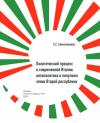Russia and International Cooperation in the Arctic
Вход
Авторизуйтесь, если вы уже зарегистрированы
- What problems are arising in cooperation of Russian and international oil and gas companies in the Arctic?
There is of course Shtokman, which has had problems in terms of getting tax incentives from the government. The existing partners have not been able to take a Final Investment Decision until this is resolved. This tax issue related to Shtokman has been debated over the past year and is well known. When it comes to the three most recent Arctic deals with Rosneft, it is too soon to say what problems will arise in the cooperation agreements with its international oil industry partners, or to talk about how these problems can be dealt with. It is not possible to predict what problems will arise.
- What strategy of international cooperation would be the best for Russia?
In terms of a model for international cooperation, Russia has already decided and is carrying out. For now, Russia has determined that it is the right model. The Rosneft deals illustrate this form of cooperation which brings money and technology to Russia while also providing Rosneft with access to oil developments with its international oil company partners outside Russia. 
- What should the Russian government do to attract foreign companies to the development of natural resources in the Russian Arctic? How the Russian government should promote the Northern Sea route?
On the Northern Sea route, the Russian government may already be doing the most it can. While the NSR cuts travel time to Asia, icing conditions still prevent its year round operation. It will remain an expensive route to use because of the need for ice breaking tankers. My impression is that we are in the very early stages of this Russian Arctic opening and as such, in the early stages of trying to assess how it will work. We have very little to go on – so far we can’t talk about any lessons that are learned or whether Russia should have done things differently. Certainly the international industry must be waiting for the tax incentives to be adopted in October 2012. The enticement for these big oil companies to enter into these complex, expensive projects are the tax incentives.




